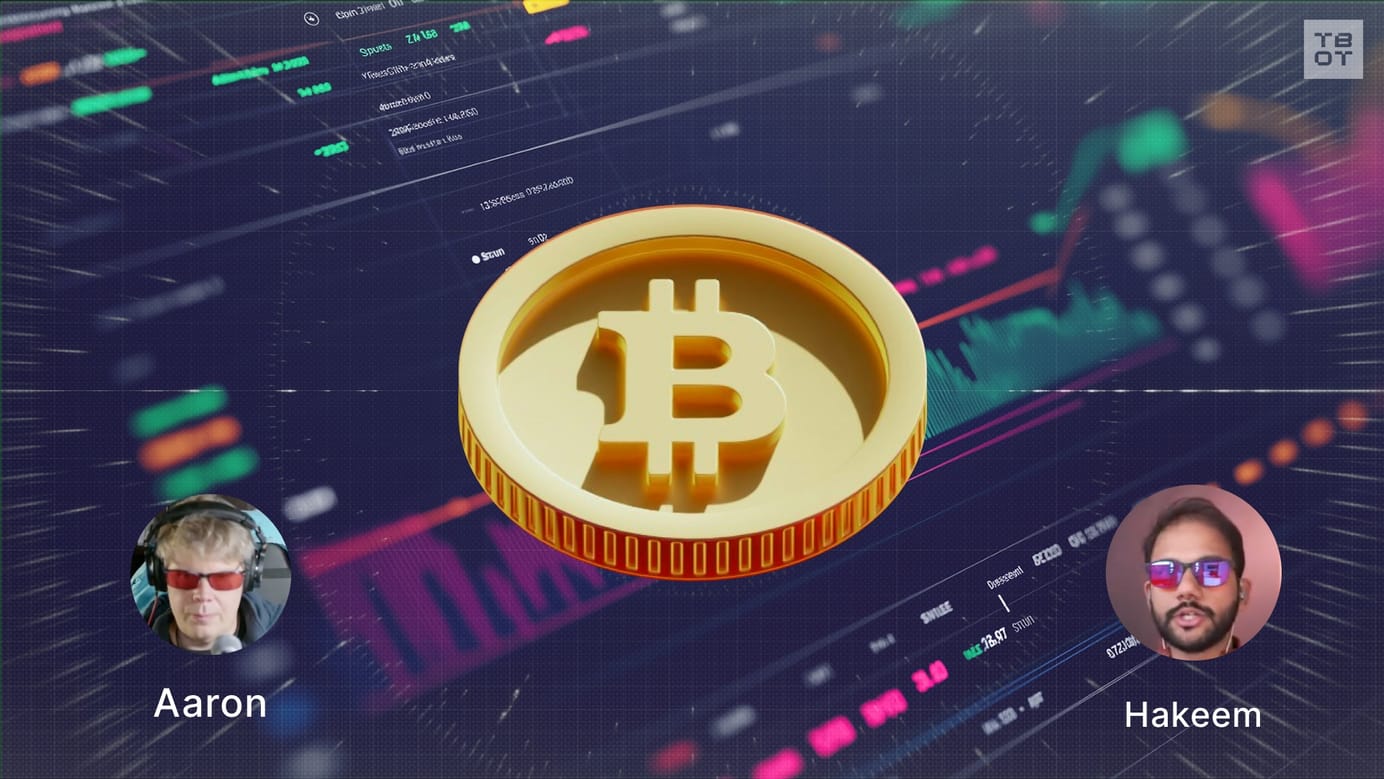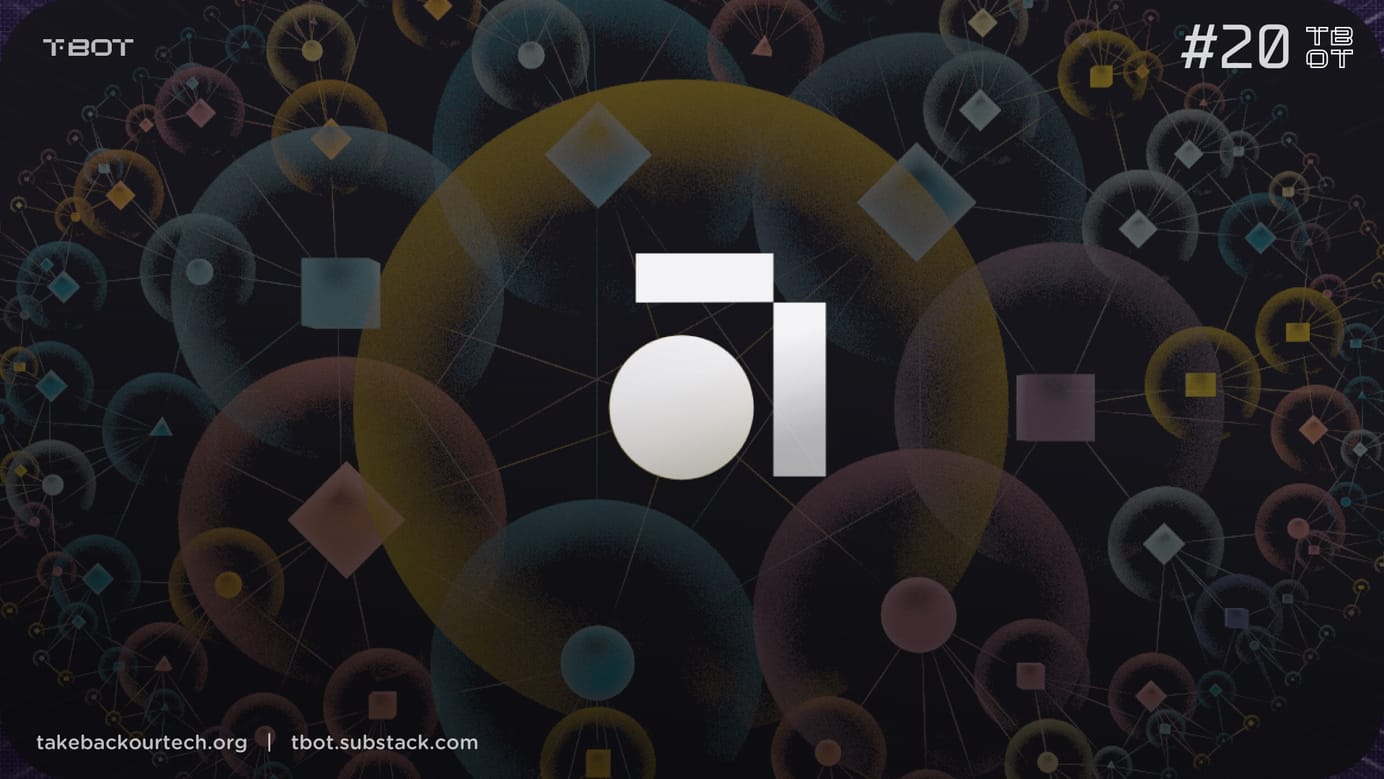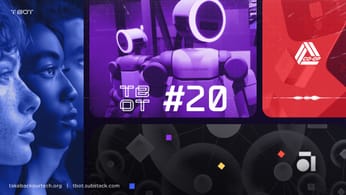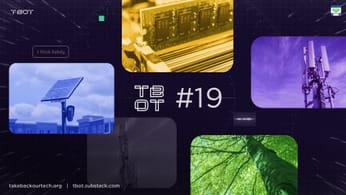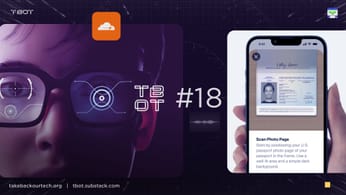
Jack Dorsey’s Bitchat - built in a weekend?
Last month Jack Dorsey, co-founder of Twitter and founder of Square with a projected net worth of over $3B dollars launched a community software project to the world - all in a weekend with the help of AI.
Last month Jack Dorsey, co-founder of Twitter and founder of Square with a projected net worth of over $3B dollars launched a community software project to the world - all in a weekend with the help of AI.
We can only take a weekend project so seriously, but the app had made waves around the internet. Bitchat, is a decentralized messaging app that uses phones and Bluetooth to create a mesh network of devices.
Warning - there are a lot of scammers offering versions of Bitchat online, repackaging the app into their own versions. These could have malware. Its best to get the app from the official Bitchat website.
https://bitchat.free/
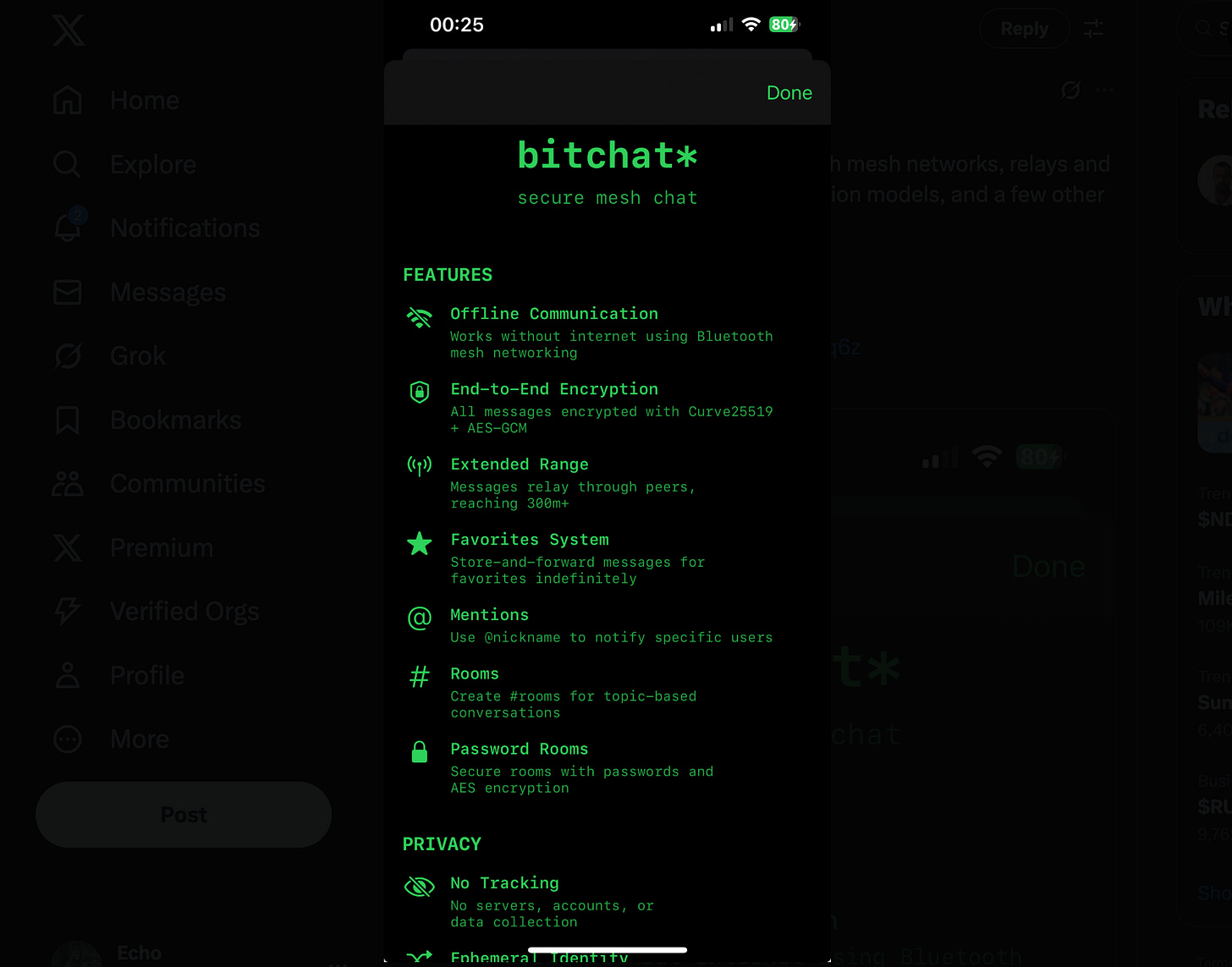
It uses end to end encryption, and can have password protected groups. It requires no sign up or account creation, and doesn’t register any phone numbers or emails. By default, messages aren’t saved forever on your phone.
Its touted as an app that can be used in emergency situations, for when cell towers and internet fail - people with Bitchat can still communicate. Its also meant for privacy-critical scenarios such as protests and demonstrations or confidential meetings.
We’ll chat about Bitchat’s main components:
- Bluetooth mesh networking, which we’ve seen in other apps like Briar
- The Noise Protocol for encryption
- Ephemeral peer IDs
Let’s talk about the mesh networking. Each phone using Bitchat acts as a sender and relay, which means phones that are close enough to each other can form a mesh network. Messages hop from phone to phone until they reach their destination, each hop can travel up to a distance of around 30m.
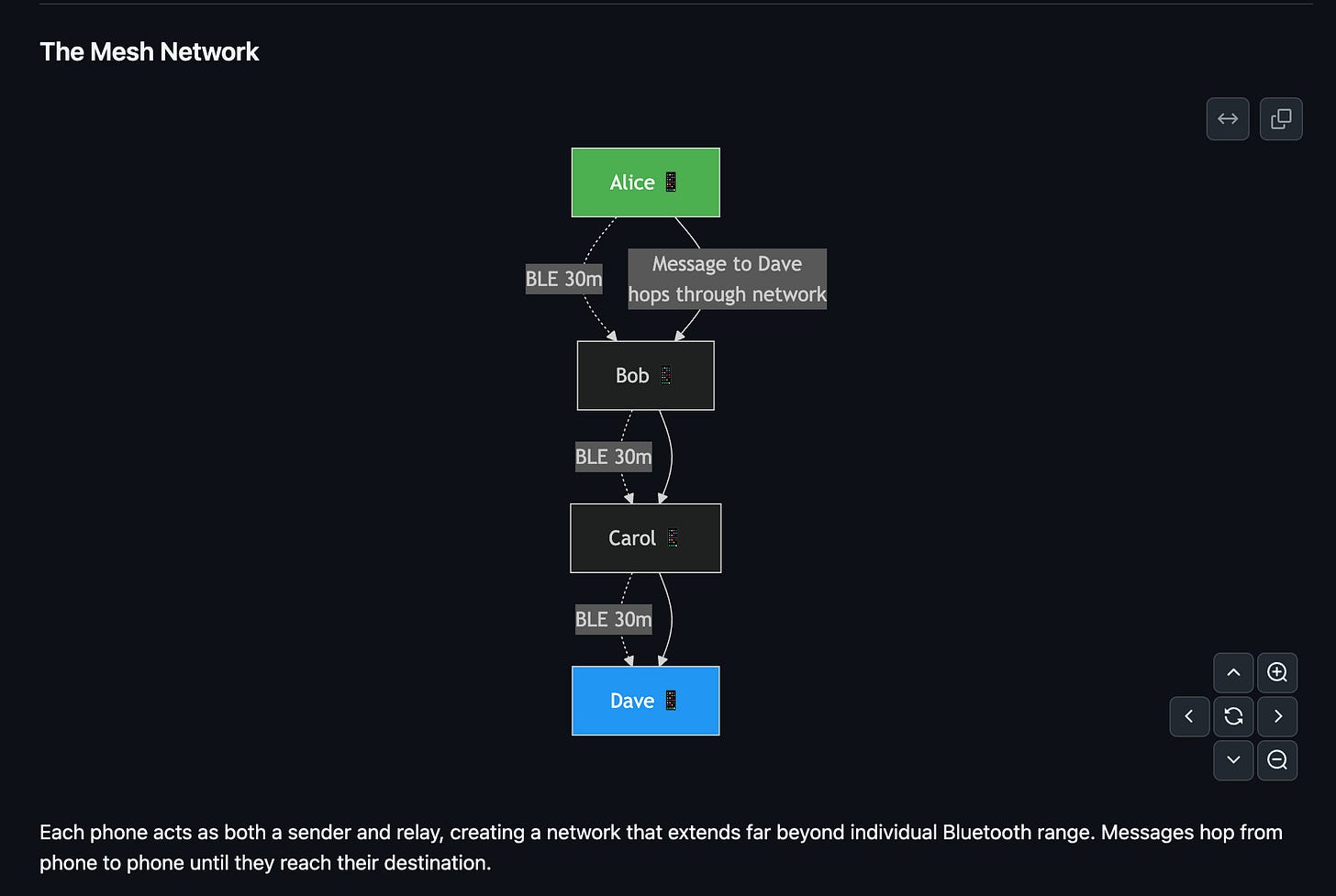
The second aspect is Bitchat’s encryption. Bitchat uses the Noise Protocol, the current gold standard for cryptography frameworks. The Noise Protocol is also used by software like WhatsApp, Wireguard, Signal, and the Lightning Network. It can be thought of as a toolset that contains patterns that can be used in secure encryption protocols. Developers can design their own encryption protocols by using these standardized patterns so that two parties can exchange the necessary keys to communicate securely and verify each other’s messages.
The last piece is privacy through rotation by using ephemeral peer ID rotation. So the unique identifer assigned to your device will continue to change, but the public key will remain the same. Both parties will still be able to know each other’s identity while their IDs change.
A lot of this sounds like magic, and cryptography can be very esoteric. I’m not a cryptographer, but i’ll give my thoughts on the effectiveness of this app in a real world.
Typically in mesh networks where messages are routed between all devices on the network, there is a maximum number of hops the protocol will allow. Its unclear the number of hops Bitchat allows, but with a maximum range of about 300 meters, its anywhere from 7 to 10 hops. This is a good range for a Bluetooth Low Energy mesh network, but still the app will only be useful in densely populated areas where a reasonable proportion of people are using the app.
Another interesting point is the app was developed for the iOS ecosystem using the Swift language, which then was ported to Android. The iOS app is running a private Beta, while the Android app is available for download at https://bitchat.free
The intended use case of the app seems to model against threats of the highest levels, such as journalists holding on to state secrets. These types of attackers would have no problems taking over the phones of activists, and iPhones themselves are black boxes, and suffer from many avenues of vulnerabilities.
You could have the best encryption protocol, but if a user is using an Apple device then they risk information leakage by way of the operating system. The OS could be keylogging the user as they type in messages and reading data from the display of the phone, bypassing the end-to-end encryption the app provides.
For this reason, its strange that an app attempting to provide protection for high risk comms decided to build itself upon a proprietary ecosystem that could circumvent the app’s intended purpose.
Also, concerning is Dorsey’s history of working with the US State Department where he joined delgations to Iraq and Russia. He also obliged to requests by Jared Cohen to keep Twitter online during the Iranian green revolution.
These actions line up with a long history of Western imperialism and meddling with the politics of other countries, typically those ideologically oppposed. You can see this type of messaging and focus for other major privacy projects, such as Tor and Signal. The use case for these apps are always used to ‘fight’ tyranny outside of the West, but rarely ever inside them.
I’m also reminded of Surveillance Valley, the book by Yasha Levine where he dives into how the founders of Signal and Tor received millions as US defense contractors, typically through grants and non-profits like the Open Technology Fund. These organizations acted as fronts to promote US government created privacy tech, which would further single out bad actors wanting to be ghosts, because they didn’t account for backdoors in the software.
However, we can’t take the app too seriously because I realized halfway through my research that Dorsey built this app in a weekend using a Vibe Coding tool he developed, “Goose”.
How much can you expect from a project developed and conceived over a weekend? Although the software checks all the right boxes to promote privacy and freedom, this seems more like a nod at Goose that everyone is taking seriously as a real app.
I personally don’t think Bitchat will be the tool that solves our communication problems, I’m looking to long range radio projects like Beechat.Network - which build ontop of other open protocols like Reticulum.
But still, you can’t deny Dorsey’s creation. The positive spin would be that Dorsey is subtly hinting that building software is now accessible to all, and Bitchat was just the foreword to a new chapter of the technology industry, where anyone — anywhere could build anything.
👩💻 Get private phones, laptops, and tablets
📲 Learn more on our webinars
Take Back Our Tech Newsletter
Join the newsletter to receive the latest updates in your inbox.

